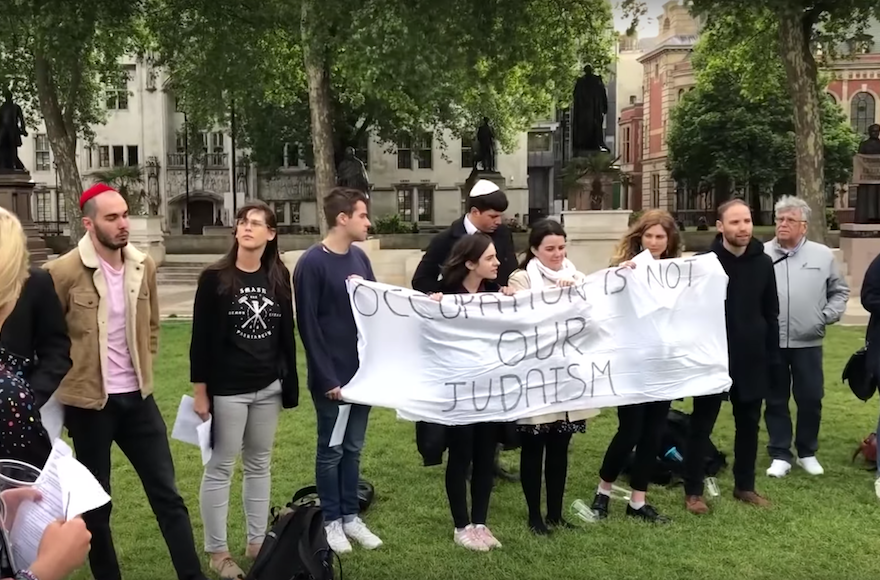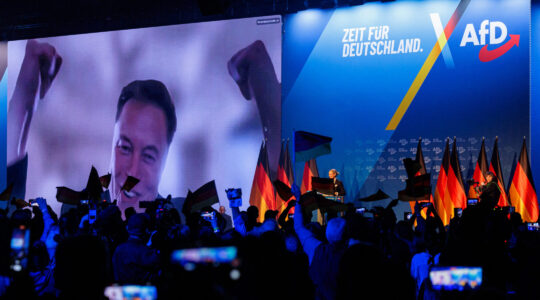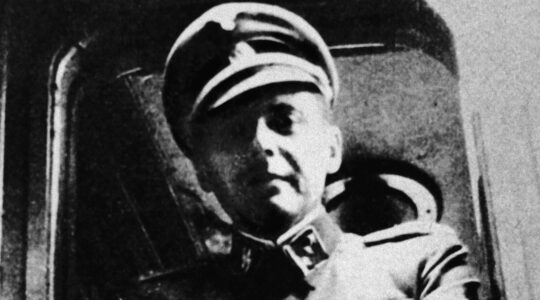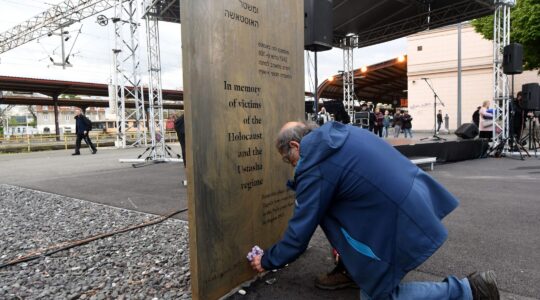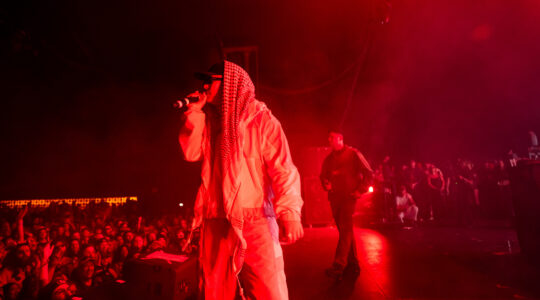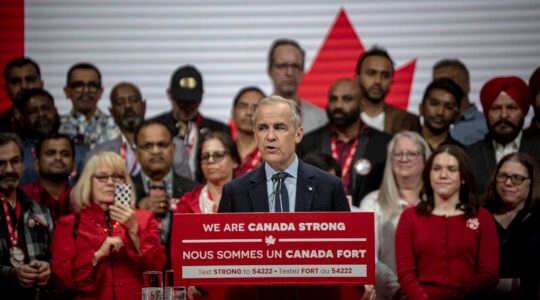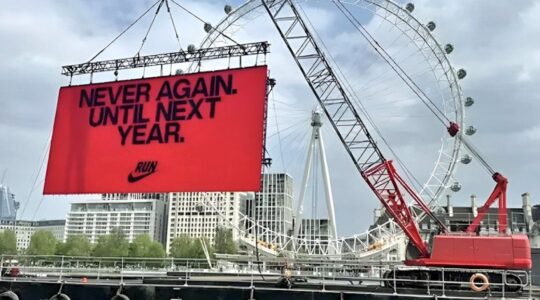(JTA) — Martin Hizer was driving his taxi through London when he learned that a group of Jews were saying a public mourning prayer for Palestinians killed in Gaza.
“Frankly, I was fuming,” Hizer, who is Jewish, said in an interview on YouTube for a pro-Israel channel. The video shows him confronting the 50 Jewish protesters in Parliament Square on May 16 as they said Kaddish for the 61 Palestinians killed that week in clashes with Israeli troops.
“Fifty of them were identified as Hamas operatives,” he booms, pointing his finger at a male protester. “And you f***ing pricks, you’re saying Kaddish for them?! They would’ve f***ing killed you if you were there!”
Hizer’s tirade was brief. But his response was part of an unusually toxic debate that featured online shaming, insults and threats directed by Jews against Jews — uncharacteristic for British Jewry.
The comment section of a YouTube video of the event features an outpouring of hatred and incitement to violence toward the young men and women who attended.
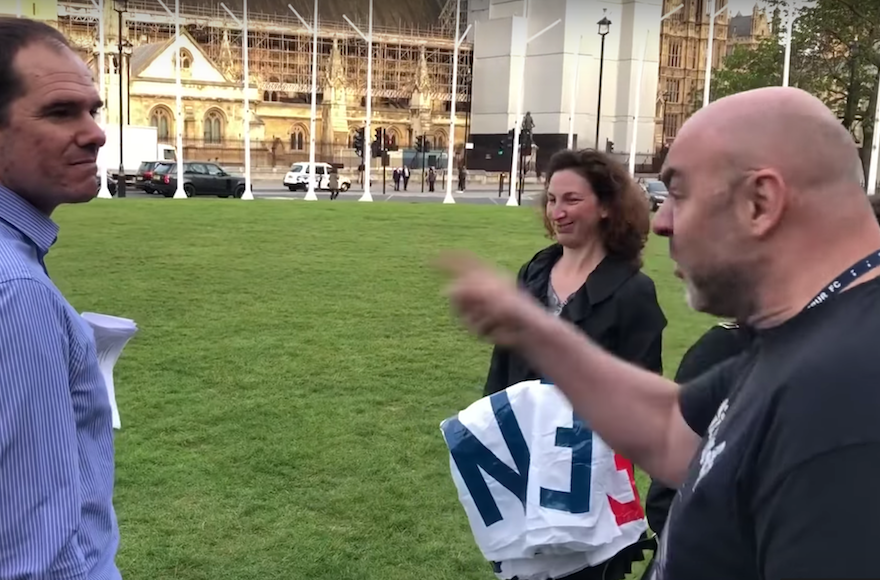
Martin Hizer, right, arguing with people at the Kaddish for Gaza event. (Screenshot from YouTube)
“I’d suggest gathering them within a space of three meters and throwing a grenade there,” YouTube user Moshe Harmanov wrote.
Jonathan Hoffman, a pro-Israel activist from London, posted a link on Facebook to a page containing participants’ names headlined “Traitors behind Kaddish for Hamas.”
Hundreds of comments, some apparently breaking laws against threats and incitement to violence, were directed at organizers and participants of the event and left-leaning organizations — including Zionist ones — with whom some of the people in attendance were affiliated.
Nina Morris Evans, an Oxford student who attended the Kaddish for Gaza event, said no one who came anticipated the backlash.
“It’s upsetting, especially people who send me rude private messages on Facebook,” she said. The author of one message called her a “disgrace to her heritage.” Another wrote: “This is who you are. A feeble excuse, self-loathing, weak, traitorous.”
Left- and right-wing Jews elsewhere were divided over the deaths in Gaza, which came on the same day that the United States dedicated its new embassy in Jerusalem. Some American Jews on the left criticized Israel for using disproportionate force on the thousands of Gazans who had massed at the border to demonstrate, at times violently, for their right to return to their ancestral lands in Israel. Most centrist and right-wing groups supported Israel’s actions, saying many protesters were armed with Molotov cocktails and that Israel had the obligation to repel those who tried to breach the border.
Among British Jews, however, the fallout of the Kaddish for Gaza event was so unprecedented that it prompted Rabbi Laura Janner-Klausner, a leader of the Reform movement in Britain who rarely engages in hyperbole, to warn in an interview with the Jewish News that her community is on “a path to self-destruction.”
This path, she said, features “one Jew wishes another dead,” crossing “the boundaries of decency and we are now into violent, harassing, bullying behavior.”
Disagreements over Israel often result in acrimonious exchanges between Zionist Jews and those belonging to the anti-Zionist minority, Keith Kahn-Harris, a London-based writer and sociologist, told JTA. But he said the vitriol around the Kaddish for Gaza affair was unprecedented because “for the first time, the same kind of venom also [was directed at] some Zionist left-of-center groups.”
The Kaddish for Gaza event was advertised on the personal Facebook page of a staff member of Yachad, a dovish group that identifies itself as pro-Israel and anti-occupation, and which is represented at the Board of Deputies of British Jews, British Jewry’s main umbrella federation. Yachad said none of its staff attended the event and the organization did not participate in organizing it.
The United Kingdom branch of the left-wing Meretz party in Israel also advertised the event on its official Facebook page. Meretz UK did not reply to JTA’s request for an interview. Members of LJY Netzer, a mainstream youth movement of the Liberal Synagogue in London, also attended.
Marco Schneebalg, an organizer of the event, told JTA he was aware at the time that a Hamas official had said that 50 of the 61 people killed belonged to the terrorist group, and it was possible that some of them might have liked to kill him because he is Jewish. He came anyway to protest Israel’s policies toward the Palestinians and “mourn the dead” because he believes that “their political opinions are not the issue.”
Schneebalg, 27, added that if Israelis had also died during the latest clashes, he would have also mourned their deaths.
At the Kaddish for Gaza event, one participant was filmed saying “When Palestinians stand resolute on the Gazan border [asserting] their freedom and their right to return, they are not committing acts of terrorism, they are performing a mitzvah.” Another said: “I am here because I refuse to sit by as my community doesn’t condemn outrageous acts of violence.” A third participant said: I’m here because I’m sick of listening to [people] equivocate and make excuses for Israel.”
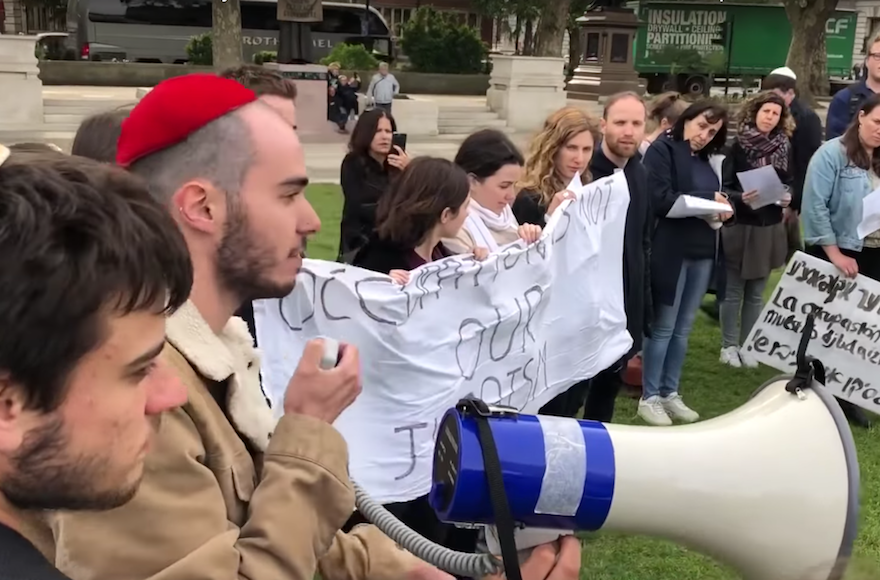
The Kaddish for Gaza event sparked backlash online. (Screenshot from YouTube)
The Board of Deputies of British Jews published a statement on the May 14 riots blaming only Hamas, which organized the demonstrations.
Laura Marks, a former vice president of the Board of Deputies, said the mourning for Hamas members is “deeply problematic.” But she lamented the branding as traitors and enemies of young men and women who “will be the future bedrock of our community.”
The backlash, Marks said, is connected to what she described as a recent recession in tolerance for dissent within the community’s ranks because of uncertainty and the rise of anti-Semitism in the United Kingdom.
Last year, the CST watchdog on anti-Semitism in Britain recorded a record 1,382 anti-Semitic incidents, of which 145 involved physical violence against Jews. Many of the perpetrators were described as Muslims or Arabs.
The increase, CST said, possibly owed to the proliferation of anti-Semitism in the ranks of the Labour Party, once a political home for British Jewry. The outgoing president of the Board of Deputies, Jonathan Arkush, said in 2016 that most British Jews “cannot trust” Labour following the 2015 election of Jeremy Corbyn, a hard-left politician, as party leader.
Amid signs that Corbyn’s popularity is rising considerably despite his involvement in a number of scandals featuring anti-Semitic and harsh anti-Israel speech, some British Jews are saying they will leave the United Kingdom if he is elected prime minister.
And then there’s the United Kingdom’s impending departure from the European Union, which CST says has triggered a wave of nationalist sentiment and many xenophobic assaults.
Janner-Klausner, the Reform rabbi, also traced the outpouring of hostility over the Kaddish for Gaza event to external threats.
“We have spent so long focusing on other people attacking us,” she told the Jewish News, that “we have internalized that and are now turning it on each other.”
JTA has documented Jewish history in real-time for over a century. Keep our journalism strong by joining us in supporting independent, award-winning reporting.
